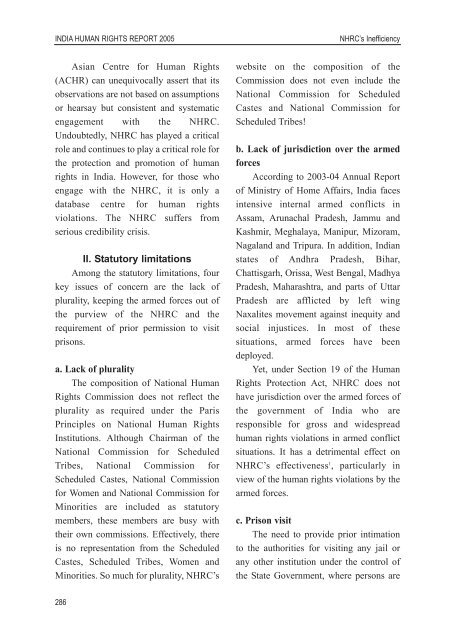annual report print final.qxd - Asian Centre for Human Rights
annual report print final.qxd - Asian Centre for Human Rights
annual report print final.qxd - Asian Centre for Human Rights
Create successful ePaper yourself
Turn your PDF publications into a flip-book with our unique Google optimized e-Paper software.
INDIA HUMAN RIGHTS REPORT 2005 NHRC’s Inefficiency<br />
<strong>Asian</strong> <strong>Centre</strong> <strong>for</strong> <strong>Human</strong> <strong>Rights</strong><br />
(ACHR) can unequivocally assert that its<br />
observations are not based on assumptions<br />
or hearsay but consistent and systematic<br />
engagement with the NHRC.<br />
Undoubtedly, NHRC has played a critical<br />
role and continues to play a critical role <strong>for</strong><br />
the protection and promotion of human<br />
rights in India. However, <strong>for</strong> those who<br />
engage with the NHRC, it is only a<br />
database centre <strong>for</strong> human rights<br />
violations. The NHRC suffers from<br />
serious credibility crisis.<br />
II. Statutory limitations<br />
Among the statutory limitations, four<br />
key issues of concern are the lack of<br />
plurality, keeping the armed <strong>for</strong>ces out of<br />
the purview of the NHRC and the<br />
requirement of prior permission to visit<br />
prisons.<br />
a. Lack of plurality<br />
The composition of National <strong>Human</strong><br />
<strong>Rights</strong> Commission does not reflect the<br />
plurality as required under the Paris<br />
Principles on National <strong>Human</strong> <strong>Rights</strong><br />
Institutions. Although Chairman of the<br />
National Commission <strong>for</strong> Scheduled<br />
Tribes, National Commission <strong>for</strong><br />
Scheduled Castes, National Commission<br />
<strong>for</strong> Women and National Commission <strong>for</strong><br />
Minorities are included as statutory<br />
members, these members are busy with<br />
their own commissions. Effectively, there<br />
is no representation from the Scheduled<br />
Castes, Scheduled Tribes, Women and<br />
Minorities. So much <strong>for</strong> plurality, NHRC’s<br />
286<br />
website on the composition of the<br />
Commission does not even include the<br />
National Commission <strong>for</strong> Scheduled<br />
Castes and National Commission <strong>for</strong><br />
Scheduled Tribes!<br />
b. Lack of jurisdiction over the armed<br />
<strong>for</strong>ces<br />
According to 2003-04 Annual Report<br />
of Ministry of Home Affairs, India faces<br />
intensive internal armed conflicts in<br />
Assam, Arunachal Pradesh, Jammu and<br />
Kashmir, Meghalaya, Manipur, Mizoram,<br />
Nagaland and Tripura. In addition, Indian<br />
states of Andhra Pradesh, Bihar,<br />
Chattisgarh, Orissa, West Bengal, Madhya<br />
Pradesh, Maharashtra, and parts of Uttar<br />
Pradesh are afflicted by left wing<br />
Naxalites movement against inequity and<br />
social injustices. In most of these<br />
situations, armed <strong>for</strong>ces have been<br />
deployed.<br />
Yet, under Section 19 of the <strong>Human</strong><br />
<strong>Rights</strong> Protection Act, NHRC does not<br />
have jurisdiction over the armed <strong>for</strong>ces of<br />
the government of India who are<br />
responsible <strong>for</strong> gross and widespread<br />
human rights violations in armed conflict<br />
situations. It has a detrimental effect on<br />
NHRC’s effectiveness 1 , particularly in<br />
view of the human rights violations by the<br />
armed <strong>for</strong>ces.<br />
c. Prison visit<br />
The need to provide prior intimation<br />
to the authorities <strong>for</strong> visiting any jail or<br />
any other institution under the control of<br />
the State Government, where persons are



